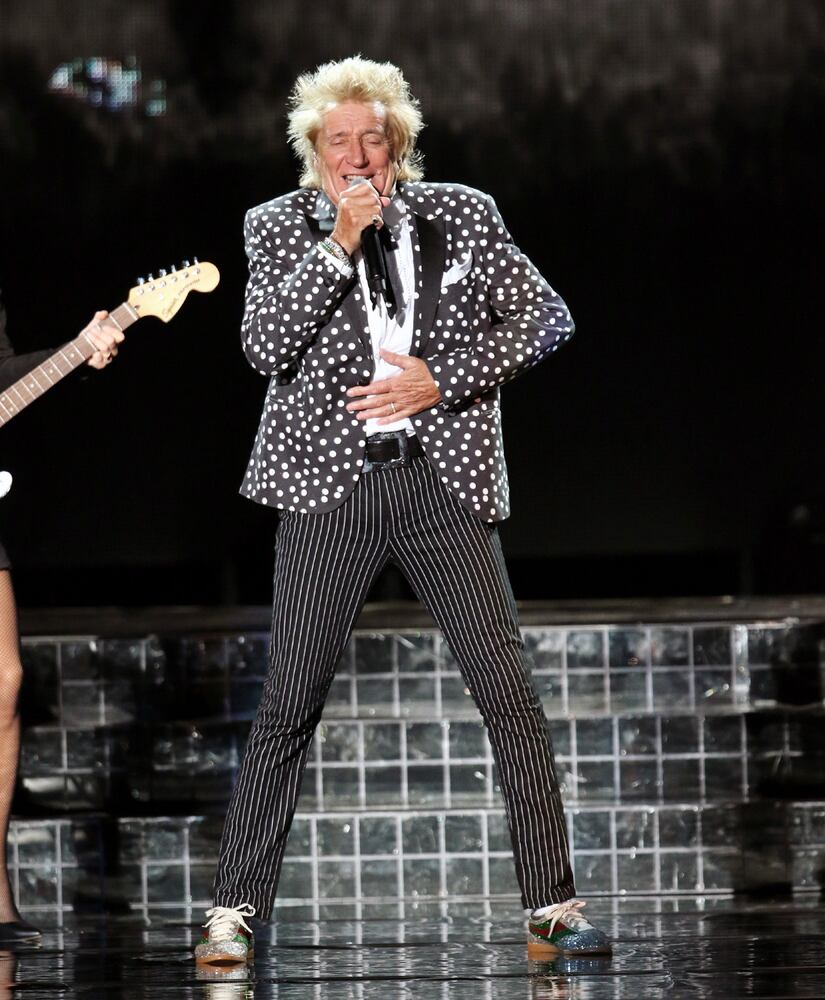Introduction
There are moments in music history when a performance transcends entertainment and becomes something larger- a cultural flashpoint, a national statement, a
scene that will be replayed for years to come.
Last night in London, Sir Rod Stewart created such a moment.
What began as a handful of jeers turned into one of the most powerful displays of unity ever witnessed at a concert.
And it wasn’t achieved with anger, shouting, or confrontation.
Instead, the legendary rocker did something no one predicted: he sang the national anthem.

The Spark of Dissent
The night had been rolling smoothly.
Stewart, at 79, was commanding the stage with his signature mix of raspy vocals and enduring charisma.
The energy inside the stadium was electric-until it wasn’t.
From near the front rows, a group began chanting slogans critical of Britain. At first, their voices were scattered, faint.
But soon, they grew louder, piercing through the music.
For a few tense moments, the attention shifted away from the performance and toward the disruption.
Most artists might have called security, paused the show, or even stormed off. But Stewart chose a path few expected.
The Turning Point
He didn’t raise his voice. He didn’t scold the crowd.
Instead, Stewart raised his microphone slowly, like a man weighing the gravity of his next move.
And then, softly, almost like a prayer, he began to sing:
“God save our gracious King…”
At first, it was just him. One voice-fragile, steady, unaccompanied. The band, stunned, fell silent.
For a heartbeat, the crowd seemed confused. Was this a joke? A stunt?
But within seconds, the confusion turned into realization.

The Rising Chorus
All across the stadium, people rose to their feet. Slowly at first, then in waves.
Voices began to join his-timid, shaky, but growing in force.
Within a minute, the sound of 25,000 people singing together filled the air.
Flags were hoisted into the night sky. Strangers wrapped arms around each other.
Tears streamed down faces in every section of the arena.
The chants that had disrupted the night? Gone.
Drowned out, silenced, replaced by something infinitely stronger: collective pride, unity, and defiance – all expressed through song.
By the final line, the anthem wasn’t just music. It was thunder.
The Audience Reaction
Those who were there say it was less like a concert and more like a national
rallying cry.
“I’ve been to hundreds of shows in my life,” one fan posted on social media minutes after the event.
“But I’ve never felt something like this. It was like the entire arena became one voice, one heartbeat.
Stewart didn’t just sing-he led.”
Another fan, who admitted to being skeptical of Stewart’s staying power, wrote:
“Tonight he showed me why legends are legends. Not because of the hits. Not because of fame. But because when the moment comes, they rise above.”
Stewart’s Statement Without Words
What made the moment so striking was not just the song, but the choice behind it.
In a world where anger often meets anger, Stewart chose calm. Where confrontation might have sparked chaos, he chose grace.
He didn’t fight. He didn’t argue.
He reminded everyone what it means to lead – not through force, but through example.
And in doing so, he may have staged the most powerful performance of his career.
The Aftermath Online
Within hours, videos of the moment flooded social media.
Clips of the crowd singing along went viral on TikTok and Twitter, amassing millions
of views overnight.
One headline read:
“Rod Stewart Turns Protest into Anthem of Unity.”
Another framed it differently:
“Sir Rod Shames Anti-British Chants with One Song.”

Debate erupted almost instantly. Supporters praised Stewart’s choice as “pure class” and “a masterclass in leadership.”
Critics, however, argued it blurred the line between music and politics.
But regardless of perspective, one truth was clear: people were talking.
Analysts Weigh In
Cultural commentators were quick to dissect the moment.
Music journalist Fiona Havers described it as:
“A rare instance where an artist uses silence, poise, and song to command more power than any speech could.
Stewart transformed a moment of hostility into one of harmony.”
But political analyst Marcus Keene saw another layer.
“In an age of division, Stewart didn’t just sing an anthem – he took a side.
That will win him fans and critics alike. But make no mistake: it was deliberate, and it was effective.”
Why It Matters
:max_bytes(150000):strip_icc():focal(999x0:1001x2)/rod-stewart-vegas-residency-080724-5-488c52202d4942d39ac884e26fa7e250.jpg)
For decades, Rod Stewart has been celebrated for his voice, his charisma, and his longevity.
But last night, it wasn’t about the hits or the showmanship.
It was about timing. It was about presence.
And most importantly, it was about reminding people that leadership doesn’t always roar-sometimes, it simply sings.
Conclusion
When history remembers Rod Stewart, it will recall the sold-out tours, the chart-topping singles, and the unmistakable voice that defined an era.
But after last night, another memory will stand alongside those: the night he silenced division not with outrage, but with a song.
A night when one man, one microphone, and six simple words – “God save our gracious King” – turned chaos into unity.
And in doing so, Rod Stewart didn’t just reclaim the stage.
He reminded a nation what it means to stand together.



